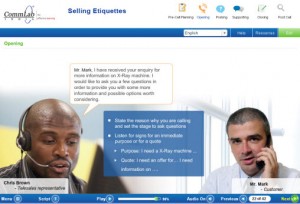Scenario Based Approach For Customer Service Training

“The Customer Experience is the next competitive battleground” – Jerry Gregoire
Does customer service only mean responding to a customer’s call? Can customer service be overlooked? What does customer service actually mean to a customer? Customer service can be defined as a process of ensuring customers’ satisfaction by fulfilling their wants and needs on time.
Customers are the only source for organizations to gain profit and therefore it is the responsibility of organizations to deliver to them best service, which results in customer delight.
Training employees is an essential aspect that helps to boost their confidence levels and leads to job satisfaction. It also ensures that they are able to provide good customer service experience. Training on customer service metrics helps them to know the measures they have to handle to ensure customer satisfaction. For example, if we consider a situation of how to address a customer issue over a telephone call, it involves the following metrics:
- Metric1: How to respond to a customer who is calling over the telephone?
- Metric2: How to analyze a customer issue on a phone call?
- Metric3: How to solve it effectively?
- Metric4: If the call needs to be transferred, within what time span should it be done?
- Metric5: Once the issue is solved, how to end the call?
In this context, training helps to impart knowledge related to customer metrics but doesn’t equip employees with the knowledge of how to apply them practically in their job.
Training – The Solution
The solution for this can be training employees about customer process metrics using scenarios. Learning through scenarios can be the best method for soft skills training because it helps to impart practical job knowledge to learners.
Now let us see what scenario-based approach is and why it is effective for customer service training.
Scenario – Based Training Approach
Scenario-based approach is defined as a new trend that aims to improve in-depth learning and makes learners aware of the situations where they need to respond promptly in a given situation. Here a scenario can be a real-life situation, a story or a critical incident. This approach of learning can also be used in sales trainings because it helps sales persons to gain knowledge on the do’s and don’ts of a sales process.
Scenario-based learning helps the newly hired employees to gain knowledge on how to apply effective communication skills on the job. It helps to improve the learner’s cognitive skills. The active participation of employees in the scenario-based course helps them to render excellent customer service.
Here are some screenshots with scenarios from of an eLearning course:



The above screenshots represent how a typical eLearning course using scenarios will look like.
If you have any views about scenario-based learning, please do share your thoughts in the comment section.




![10-point Checklist to Ensure Knowledge Transfer Through eLearning [SlideShare]](https://blog.commlabindia.com/hubfs/Imported_Blog_Media/elearning-knowledge-transfer-checklist-slideshare.jpg)
